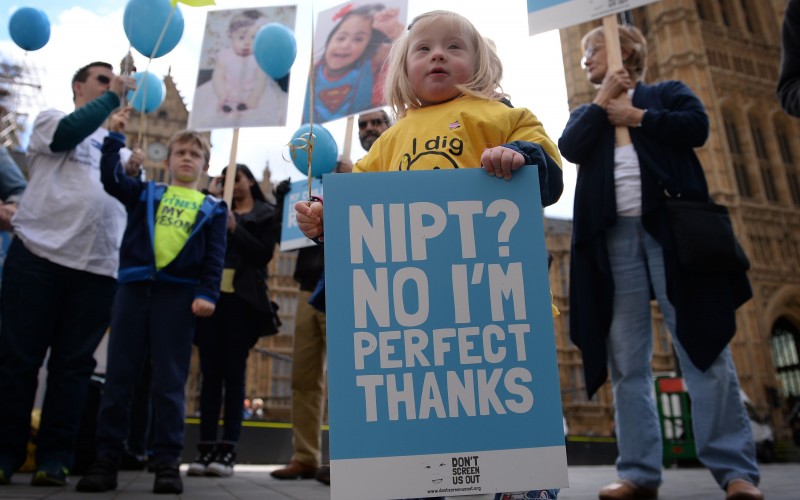PRESS RELEASE – FOR IMMEDIATE RELEASE
Isle of Man government should revoke decision to roll-out new Down’s syndrome prenatal test without consultation and ethical review
Down’s syndrome advocacy group Don’t Screen Us Out are calling on the Isle of Man government to revoke a decision to roll-out a new-prenatal test that is projected to lead to a profound increase in the number of children with Down’s syndrome screened out by termination.
The group are very concerned that this announcement has been made without consultation with people with Down’s syndrome and their families. They are similarly very disappointed that there appears to have been been no assessment made by the Manx Department of Health and Social Care of the impact that the roll-out will have on the lives of people with Down’s syndrome. There also appears to have been no ethical review of the proposed roll-out.
In a recent report the International Bioethics Committee (IBC) of the United Nations Educational, Social, and Cultural Organisation (UNESCO) issued a stern warning about the drive to adopt NIPT in national screening programmes, “the potential ethical disadvantages of NIPT can be summarised as routinisation and institutionalisation of the choice of not giving birth to an ill or disabled child”.
People with Down’s syndrome and their families have been taking to the airwaves, broadcast TV and newspapers around voicing the alarm they have felt about this new testing. Recently the airing of Bridget Jones’s Diary star Sally Phillips’ BBC documentary A World Without Down’s Syndrome has generated much discussion about the proposed rollout.
Douglas resident Frances Tinkler parent of Elizabeth who has Down’s syndrome said:
“We are calling on the Health Minister Kate Beecroft to immediately revoke this decision. The Isle of Man Department of Health and Social Care appear to have approved the NIPT roll-out without consultation with the very group that this is going to have the biggest impact on, people with Down’s syndrome and their families. The Manx Government have also made no assessment of the impact this will have on the community of people with Down’s syndrome.
Lynn Murray, spokesperson for Don’t Screen Us Out said:
This roll-out is projected to result in an increase in the number of children with Down’s syndrome screened out by termination. The decision released today will have a massive impact on our community.”
ENDS
- For more information on the Don’t Screen Us Out campaign, see www.dontscreenusout.org or email info@dontscreenusout.org
- For interviews, phone Don’t Screen Us Out spokeswoman:
Lynn Murray: (0044) 01313340133, Email: savingdowns@gmail.com - Photos of past Don’t Screen Us Out events can be downloaded in high resolution and can be used for media puposes here: https://flic.kr/s/aHskFcqyC7
- Videos of past Don’t Screen Us Out events are available here and original files are availalable on request: https://www.youtube.com/channel/UCwsnM8w6ECwjDIZq0ayHmiA
.
Background:
- In England, the National Institute for Health and Research RAPID evaluation study projects that the proposed implementation there will result in 102 more Down Syndrome foetuses being identified each year and based on the current 90% of parents with a diagnosis that terminate a pregnancy, this is projected to result in 92 more Down Syndrome foetuses being aborted each year. The same study projects that it will result in 25 fewer miscarriages per year compared to the current NHS Fetal Anomaly Screening Programme. There will therefore be an overall increase in loss of lives.
- Given there were 717 Down Syndrome live births in 2013, this would represent a 13% decrease in live births for Down Syndrome – therefore likely having a profound effect on future numbers of people with Down Syndrome in the population.
- A recent report from International Bioethics Committee (IBC) of the United Nations Educational, Social, and Cultural Organisation (UNESCO) issues a stern warning about the adoption of NIPT in national screening programmes (http://unesdoc.unesco.org/images/0023/002332/233258e.pdf).
- NIPT techniques will shortly allow for the testing of the entire human genome, and the targeting of fetuses for abortion based on a range of illicitly considered characteristics.
- The future market for testing could exceed $6 billion in the US alone.



